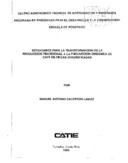| dc.contributor.advisor | Páez, Gilberto | es_ES |
| dc.contributor.author | Calderón Laínez, Manuel A. | |
| dc.date.accessioned | 2020-11-09T18:20:53Z | |
| dc.date.available | 2020-11-09T18:20:53Z | |
| dc.date.issued | 1999 | |
| dc.identifier.uri | https://repositorio.catie.ac.cr/handle/11554/9872 | |
| dc.description | Tesis (Mag. Sc.)--CATIE, Turrialba (Costa Rica) 1999 | es_ES |
| dc.description | 5 figuras. 17 tablas. | |
| dc.description | Referencias de las páginas 53-56 | |
| dc.description.abstract | La presente investigación se llevó a cabo en el departamento de Olancho, en el nordeste de Honduras. El grupo meta lo conformaron los productores de café afiliados a la Cooperativa Agroforestal Río Plátano Limitada (COAFORPLA), cuya sede se encuentra en la aldea Las Marías, jurisdicción del municipio de Dulce Nombre de Culmí. Para el análisis económico y financiero se hizo una simulación de la situación deseada, es decir, de la producción de café tradicional a café orgánico. Se utilizó el programa Farmod del Banco Mundial para modelar las 128 fincas familiares que están en producción de café. Fueron seleccionadas 71 fincas tradicionales susceptibles de transformación a la situación de producción orgánica de café con ventajas comparativas al resto de las demás fincas. isminución del sobreprecio por café orgánico certificado de 10 a 5 por ciento. La disminuci[on del precio por café orgánico certificado no presentó mayor sensibilidad cuya variación fue de apenas 1.9 puntos por debajo de la situación deseada evaluada originalmente. | es_ES |
| dc.description.abstract | The present investigation was carried out in the department of Olancho, in the northeast of Honduras. The target group was the coffee producers affiliated coffee to the Cooperativa Agroforestal Rio Plátano Limitada (COAFORPLA) whose headquarters is in the village Las Marías, in the municipality of Dulce Nombre de Culmí. Information from 134 coffee producers was gathered in 28 communities for a total of 137 different properties (three producers are proprietors of two farms each). The farms are located between 600-800 meters in altitude. The description of the traditional production of coffee of the small producers was represented by a Cobb-Douglas production function, taking as the dependent variable yield and as independent variables three production factors: 1) area cultivated with coffee in mz, 2) hired labor in Lempiras, and 3) family labor in wages. The production function was used to estimate the production of the traditional farms converted to organic farms. For the economic and financial analyses a simulation of the desired situation was made, that is to say, the production of organic coffee. The World Bank Farmod program was used to model the 128 family farms in coffee production. The financial balances of the 128 analyzed farms were discounted using the active real rate of interest averaged for the first seven months of 1999, this is, subtracting 30 percent inflation of 12.5 percent for a rate of discount of 17.5 percent per year. In the individual financial analysis, 102 farms obtained a larger Internal Rate of Return (IRR) to 17.5 percent. The approach adopted to accept an individual farm as eligible for certification is to subtract a standard deviation of the IRR (IRRi -1_irr) with regard to the IRR average (IRR=31.4 percent), to the IRR of each one of the 128 farms, where _irr = 11.7 percent. Seventy one susceptible traditional farms were selected for simulation for transformation to the situation of organic production of coffee with comparative advantages to the rest of the other farms. The global financial analysis of these farms resulted in an estimates IRR of 32.7 percent and an estimated Net Present Value (NPV) of Lps 3,519,892.00 for a ten years production period. A sensitivity analysis was implemented for three scenarios: a) without increments in the productivity of the converted properties, that is to say, with the observed production | |
| dc.format.extent | 67 páginas | |
| dc.language.iso | es | es_ES |
| dc.publisher | CATIE, Turriaba (Costa Rica) | es_ES |
| dc.rights | info:eu-repo/semantics/openAccess | es_ES |
| dc.subject | AGRICULTURA TRADICIONAL | |
| dc.subject | ANALISIS ECONOMICO | |
| dc.subject | CAFE | |
| dc.subject | CERTIFICACION | |
| dc.subject | DIVERSIFICACION | |
| dc.subject | EXPLOTACION AGRICOLA FAMILIAR | |
| dc.subject | HONDURAS | |
| dc.subject | NORMALIZACION | |
| dc.subject | RENDIMIENTO DE CULTIVOS | |
| dc.subject | CERTIFICATION | |
| dc.subject | COFFEE | |
| dc.subject | CROP YIELD | |
| dc.subject | DIVERSIFICATION | |
| dc.subject | ECONOMIC ANALYSIS | |
| dc.subject | FAMILY FARMS | |
| dc.subject | STANDARDIZING | |
| dc.subject | TRADITIONAL FARMING | |
| dc.title | Estándares para la transformación de la producción tradicional a la producción orgánica de café en fincas diversificadas | es_ES |
| dc.title.alternative | Standars for transforming traditional production to the organic production coffee in diversified farms | es_ES |
| dc.type | Tesis | es_ES |


